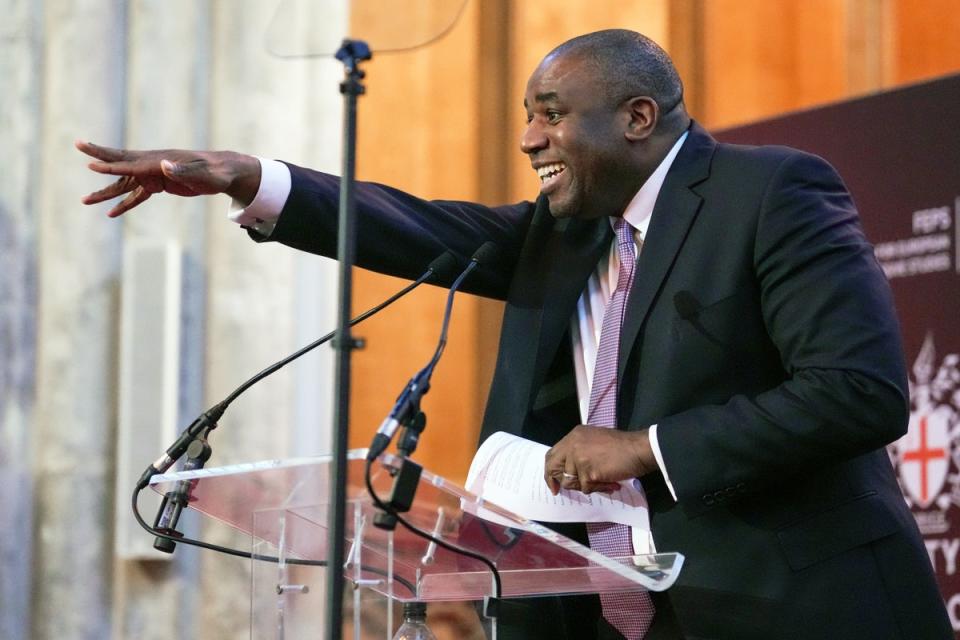Speech by Labour’s David Lammy disrupted by pro-Palestinian protesters
Shadow foreign secretary David Lammy’s speech to the Fabian Society calling for a ceasefire in Gaza was disrupted by pro-Palestine protesters.
The Labour frontbencher was addressing the think tank’s conference when flag-waving activists mounted the stage shouting: “When will you condemn the genocide? How many more children need to die?”
Mr Lammy was ushered backstage, as two people who got on stage to express outrage over support for Israel were escorted out of the building by security.
Another protestor in the audience then stood up to launch verbal attacks on the party’s approach to the Middle East conflict and said Mr Lammy “does not speak for me”.
Once Mr Lammy returned after being temporarily rushed backstage, he sparked laughter by joking: “I was born in Tottenham, don’t worry.”
Amid repeated heckling, the Labour frontbencher told the audience in London’s Guildhall: “We all want to see a sustainable ceasefire in Gaza ... I want change through power, not through protest.”
The Free Palestine Coalition later said some of its activists had infiltrated the left-wing think tank’s annual gathering to “call out” the senior politician’s position on Gaza.

Earlier, Mr Lammy said Israeli PM Benjamin Netanyahu’s comments opposing the establishment of a Palestinian state after the war against Hamas in Gaza were “unacceptable”.
And in his speech, the shadow foreign secretary went on to express support for a Palestinian state when the war ends and branded Benjamin Netanyahu’s rejection of the plans morally and practically “wrong”.
“The peaceful quest for a Palestinian state is a just cause and the only path to guarantee a just and lasting peace for both Israelis and Palestinians,” said Mr Lammy.
He added: “The Israeli government must immediately change their approach. From the pain and despair, new will and a new political process must emerge to make two states a reality.”
Mr Lammy also said a Labour government would start urgent diplomatic talks on the creation of a new “international contact group” to take over from the defunct “quartet” – the UN, US, EU and Russia – to coordinate with western and Arab partners over peace in the region.

It follows similar comments made by Sir Keir Starmer, who also condemned Mr Netanyahu’s dismissal of a two-state solution as “unacceptable”.
Hardening his tone towards the Israeli PM, on Friday the Labour leader said it was wrong to suggest that Palestinian statehood was “in the gift of a neighbour”.
In a press conference earlier this week, Mr Netanyahu said he opposed US calls for the establishment of an independent Palestinian state as part of any post-war plan.
He has vowed to press ahead with the offensive in Gaza for many months despite mounting pressure on Israel to rein in its military action as the scale of death and destruction intensifies.
But US president Joe Biden voiced hope that it was still possible even while Mr Netanyahu remains in office, following a call with the Israeli leader on Friday – their first talks in nearly a month.

Mr Lammy said on BBC Radio 4’s Today programme that Mr Biden was “right”, adding: “And I have to say, I think Netanyahu’s words were unacceptable. Of course, the Palestinian people deserve a state.”
He added: “And if they don’t, the consequence of that is either one state in which Benjamin Netanyahu would have to explain how Palestinians and Israelis live side-by-side with equal rights, or no state, in which what he’s really saying is occupation and siege continues.”
Sir Keir has faced huge pressure from the party’s grassroots left and pro-Palestine campaigners over his initial refusal to back an immediate ceasefire in the wake of the eruption of violence in October, with the Palestinian death toll approaching 25,000, according to local health authorities.
Ten frontbenchers also quit over his handling of the Gaza invasion which followed the Hamas terror attack which saw around 1,200 Israelis killed and 240 taken hostage.
In December, Sir Keir began calling for a “sustainable ceasefire”, as he and other leaders among Israel’s western allies began to move away from unqualified support for strikes on Gaza.

 Yahoo News
Yahoo News 
